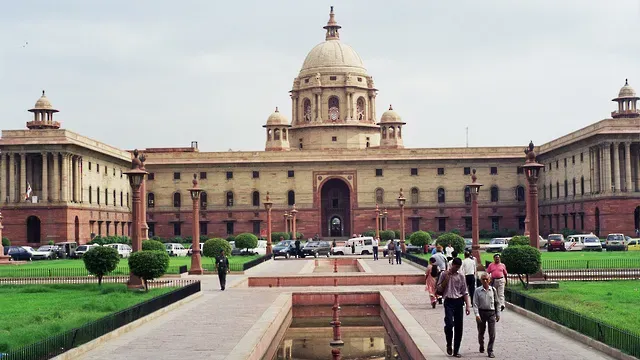The Weekend Read: Can India afford to decouple its economy from fossil fuels?
New research looks at how much of India’s revenue comes from carbon, and whether taxing it could solve the problem

Welcome to the weekend edition of Lights On, a newsletter that brings you the key stories and exclusive intel on energy and climate change in South Asia.
If you are not a subscriber, you can sign up below, for free, and if you like this newsletter, don’t forget to share it with your colleagues by hitting forward!
When imagining a world beyond carbon, we often focus on the clean technologies that countries should arm themselves with in order to cut their emissions, such as solar, wind or batteries. But clean energy development is only one part of the equation. Reducing and eventually phasing out fossil fuels is as much an economic challenge as a technical one. If all fossil fuels were to magically disappear today, many countries wouldn’t just lose a main source of energy, but a big slice of their revenues too - a problem that becomes particularly acute in coal dependent developing countries like India.
Laveesh Bhandari, senior fellow at the Centre for Social and Economic Progress and member of the Task Force on Climate, Development and the International Monetary Fund (TCD IMF), has looked at how much of India’s wealth comes from fossil fuels, and whether a carbon tax or removing fossil fuel subsidies could solve the problem, like many global observers are advocating.
He discusses some of his team’s remarkable findings with Lights On.
Lights On: What prompted you to look into the role of fossil fuels in supporting the economy?
Laveesh Bhandari: Globally and in India people are discussing the energy transition and what kind of policies we need to ease and accelerate the process. But if this transition does come about and is accelerated, as we would all like it to, how would the government be impacted by it? The first question that arose in my mind was, how are our tax revenues going to change? But if you're in India, you also know that a lot of the fossil fuel companies are in the public sector, whether it’s petroleum or coal. So we decided to look beyond tax revenues, because there will also be other financial impacts, some of which are fairly substantial.
To be able to measure these impacts, you came up with an original methodology. Can you break it down for us?
First, we logged all the different kinds of taxes that state and central governments impose on the fossil fuel sector. Once we had that, the next question was how would you expect these [figures] to change as the dependence on fossil fuel reduces over time? So we took the transition projections compiled by the International Energy Agency (IEA) as a reference, and calculated how revenues from fossil fuels would change if all the rest - tax rates, growth rates and general fiscal situation - were to remain the same. And that's where we found these amazing numbers.
Tell us more about these new figures.
Currently, more than a fifth of the central government revenues are coming in from fossil fuels. [TCD IMF’s report found that 20.8 percent of the Indian government’s total revenues came from fossil fuels in 2019. Based on their scenarios, this is projected to fall to 10.7 percent in 2030 and to 6.3 percent in 2040.]
It’s important to notice that at the time of working on this report, we didn’t have data beyond 2019. And after that, during the Covid times, government tax rates actually increased. So our numbers are fairly conservative.
What’s going to happen as India moves away from fossil fuels?
Initially, perhaps, you might have an increase in revenues, simply because of economic growth: there is growth in consumption, there is growth in demand. But as a share of total revenues, or as a share of gross domestic product (GDP), there's going to be a substantial fall. In 2019, about 3.2 percent of India's GDP was coming in from the fossil fuel sector. And this is both tax and non tax revenues. And this will go down as we go forward to one and a half percent, down to even lower numbers as per the transition path outlined by the IEA. But the fact is, whatever the transition path, there are substantial revenues, and they will go down substantially.
Let’s take a closer look at these dwindling finances: what specific revenue streams did you include in your study?
In the report, we're looking at all the petroleum products, as well as coal and natural gas. Different kinds of products have different kinds of taxes imposed on them. For example, petroleum products have something called excise duty, a tax imposed on their production. On coal we have GST [goods and services tax], a generalised sales tax, another example of indirect taxation. Then you have direct taxes: if you are a fossil fuel producing firm, then you're earning profits on which taxes are imposed.
A third element is non tax revenues. If you own an oil company, then you get dividends. And those are also part of the government's revenues.
How do your findings change the conversation around decarbonising the Indian economy?
Globally, there's a lot of discussion on two things. One is how we must eliminate fossil fuel subsidies, and the other is on how we must impose carbon taxes. Now in India's case, fossil fuel subsidies are fairly minimal. And the existing subsidies are mostly for natural gas, which is used for cooking. It would be very difficult politically, and of course from an equity perspective, to remove those subsidies because they are mostly geared towards the poor. On a practical level, it's very difficult to imagine that these subsidies will be eliminated until you do away with natural gas as a source of cooking, something we don't foresee over the next 10 or 20 years at least.
We’ve also looked at the level of carbon taxes that people are talking about, and we found that currently the existing taxes from fossil fuel revenues are far higher than [the proposed] carbon taxes. So it’s clear that on handling the government's fiscal problem, carbon taxes will not make an impact. And later, as fossil fuel usage goes down, any carbon taxes will not have much of a role anyway. So both subsidies and carbon taxes are actually not the solutions to the problem.
In light of your findings, what solutions can you propose?
Our objective was to go against the conventional wisdom, and say that — whatever you need to do — the two most talked about solutions are not [actually] solutions. We feel that the only way that you will be able to achieve this transition smoothly is if revenues from general taxation actually increase. But in India, there is also another possibility. Because we are a high growth economy, if you just ensure high growth, then that in itself generates tax revenues, even with a low tax rate.
What about renewables? Could their development deliver this growth, at least in part?
It is unlikely to, because currently renewables are only addressing part of the energy system. As the share of clean energy goes up, we will need to figure out ways of storing it, and that means the cost of renewables will be higher, because of storage costs. So either energy production prices go down further, to offset the additional cost of storage, or we’ll need to find other ways.
Our objective is to highlight that the problem is more serious than you think it is. And I don't see this as pessimism, I see this as being realistic. Slowing down the energy transition is out of the question. But we must understand the challenges and we need to prepare adequately, otherwise transition efforts themselves will be affected.
That’s all for today! If you like what you read, please consider sharing this newsletter with a friend or two:



